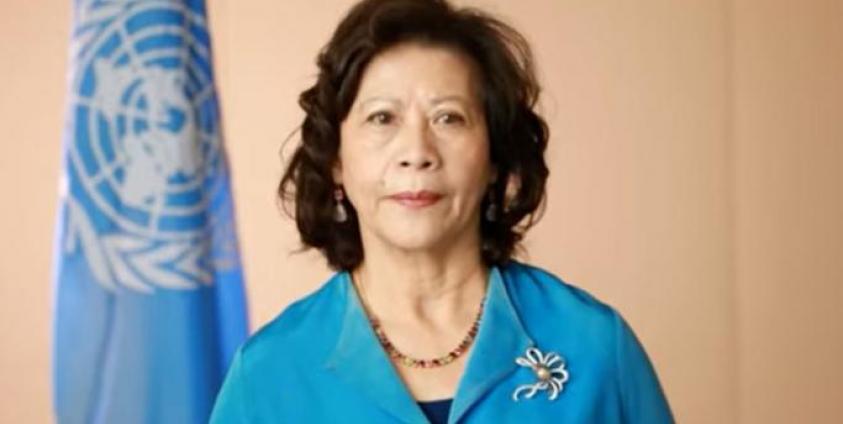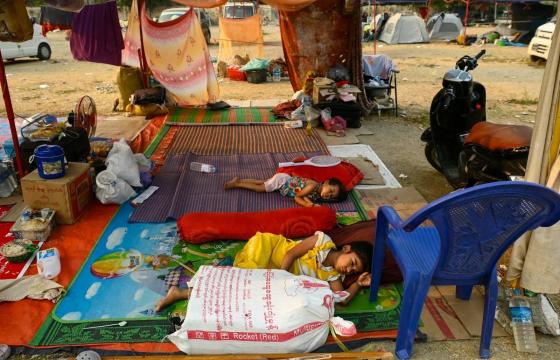UN Special Envoy for the Secretary General on Myanmar Ms. Noeleen Heyzer this week sought to clarify her negotiating position regarding the Myanmar crisis by saying she has met representatives of the National Unity Government (NUG) and other opposition players.
Since her appointment just over a year ago, Ms. Heyzer has run into controversy over the way she has been seeking a resolution of the Myanmar crisis largely because of her visit to the illegal junta in Naypyitaw last year and misunderstanding over a claim that she felt the junta should be involved in “power sharing” as part of the solution.
In a press conference at the United Nations on Thursday, Ms. Heyzer sought to correct the view that she was not effectively engaging with Myanmar’s opposition as part of her efforts to find a solution to the crisis that has plagued the country since the Myanmar generals executed a coup on 1 February 2021 and arrested many members of the elected government, including Aung San Suu Kyi.
In response to questions at the UN from a small group of journalists, Ms. Heyzer sought to clarify her negotiating stance regarding how she, as representative of the UN Secretary General, was trying to find a solution to the Myanmar crisis.
“I have to say from the very start of my appointment, I have met or I have had meetings with the NUG leadership and with and in fact I have engaged in a very intense way with many of the local actors as well. It ranged from humanitarian actors on the ground to women’s groups and to ethnic armed organizations,” the UN Special Envoy said.
“So that has been my approach because my approach is always to listen first and indeed from there to make sure I support a Myanmar-led process based on the will and the needs of the people. The thing is that although I have met with the leadership of the NUG and also with the CRPH, and this is of course the parliamentarian groups and the local organizations. Well, some of them have actually indicated publicly that they have met me. But at the same time, just a few weeks ago, I have made an arrangement to meet the foreign minister of the NUG in person and therefore I think there are some misunderstandings,” she said, noting that people are busy and while she understands the misunderstanding these issues need to be clarified.
“I am also in touch with the ethnic armed organizations, as I say, and they have actually asked me to support the Inclusive Humanitarian Forum (IHF) and that already you can’t build that kind of trust to have the local organisations coming to you and say can you convene something that is so important and that will make a difference to people’s lives. So, I think all this is just a misunderstanding, that can be easily cleared,” Ms. Heyzer noted.
The UN Special Envoy’s visit to Naypyitaw last year prompted controversy as critics claimed it lent legitimacy to the junta. In addition, there was heated criticism over a Channel News Asia (CNA) interview on 1 February 2022. Ms. Heyzer’s office was forced to issue a statement attempting explain a “misrepresentation” in the interview that prompted an angry response from Myanmar civil society organizations and the wider public. Ms. Heyzer issued a statement on 3 February 2022 saying her office regretted a misunderstanding over a suggestion in the interview – made by the interviewer - that she had used the term “power sharing” with the Myanmar junta and proposed it as a solution in the context of the political crisis in Myanmar. Her office said the envoy had “never proposed power sharing as an option and has consistently advocated for a Myanmar-led process that is reflective of the will and the needs of the people, as reflected in the 2020 elections.”
When asked this week whether she was going back to visit the Myanmar junta, she said she was “not going back unless it is meaningful and I can facilitate a change or see a change in the direction, so that is the way I am thinking.”
Ms Heyzer said her office cannot give up and must support a process that is peaceful, seeking a “movement for a more just and more democratic union of Myanmar for all.”
ASEAN appears to be the cornerstone of the UN’s approach – or at least the UN Special Envoy’s approach - to the Myanmar crisis.
“Let me say that we all agree that ASEAN would take the lead in driving the pathway towards peaceful resolution,” Ms. Heyzer told the press conference. “I have made it very clear what we need of the ASEAN Five-Point Consensus is very concrete steps that need to implemented with a timeline and there should be greater accountability if that is not done. And when I went to Naypyitaw to speak with a senior general, I stressed some of those concrete action could be, for example, to stop aerial bombings, stop the burning of civilian infrastructure, to put a public moratorium on execution, to release political prisoners, so there are many things that can be done that can actually be tracked.”
The UN Special Envoy stressed a regional approach was necessary, noting that ASEAN cannot proceed alone.
“Any step towards trying to resolve the crisis has to be done together with the neighbouring countries as well and therefore we need to take a regional approach that is much larger than ASEAN. But whatever approach we take, it has to be rooted in a Myanmar-led process reflective of the will and needs or the Myanmar people and that is extremely important. At the same time, it is not enough just to have a regional approach. We need to have a much stronger coherent, strategic and coordinated international action as well. And I am very pleased that there is today a Security Council resolution together with the UN General Assembly Resolution,” Ms. Heyzer said.
The United Nations and foreign governments have come in for criticism by members of the Myanmar public that it should do more to sanction and penalize the Myanmar military junta. Calls have been shrill for weapons and ammunition for the PDF groups, and for a No-Fly Zone to be implemented over the country to counter Myanmar junta air strikes.
None of this is forthcoming or likely, judging by the response of the international community, reflecting a vastly different approach by Western governments who have been funneling billions of dollars of weaponry and aid – the USA $140 billion alone - into Ukraine in response to the Russian invasion, but lack-lustre interest in the Myanmar crisis.
A core issue, as far as Ms. Heyzer is concerned, is the need to funnel humanitarian aid the millions of Myanmar citizens in need as a result of the crisis. Practical problems stand in the way of delivering humanitarian supplies, and concern has been raised that the UN and other international donors may try to supply aid through the military junta, with the dangers of how this might be misused.
“We need to ensure we deliver humanitarian aid using all channels and all ways and many of the actions happens to be through a combination of a mosaic approach using all available channels including those at the local administration in the local ethnic areas and so on,” she said.
“And also many of the people I have worked with, they say, it is extremely difficult to deliver the last mile to the communities and the people in need, and therefore we need to ensure that we are working very closely with local humanitarian organizations who know the field and know how to do the last mile, and therefore what we need to ensure, firstly, wherever we can greater transporter of humanitarian aid, but more importantly more flexibility and support from the donor communities to ensure that these local networks are supported,” Ms. Heyzer added.
The UN Special Envoy’s mention of flexibility from donor communities in part refers to the openness of donors to be flexible when it comes to accounting for the delivery of aid and the financing of aid delivery infrastructure, given the situation of war in the country.
Ms. Heyzer is no newcomer to Myanmar or women’s issues. In 1994, having secured a doctoral degree from Cambridge University in 1994, she was recruited by the UN as the executive director of the UN Development Fund for Women. When she arrived in New York, she found to her horror that the organisation was bankrupt. She managed to turn it around and made it into a powerhouse working for gender equality in the world. The UN Secretary General, Dr Ban Ki-moon appointed her as the executive secretary of the UN Economic and Social Commission for the Asia Pacific. During her tenure, Myanmar was struck by Cyclone Nargis in 2008. She and the ASEAN Secretary General, Dr Surin Pitsuwan, are said to have succeeded in delivering much needed assistance to the people at a time when the then-military junta was stone-walling and making it difficult for foreign aid delivery.








